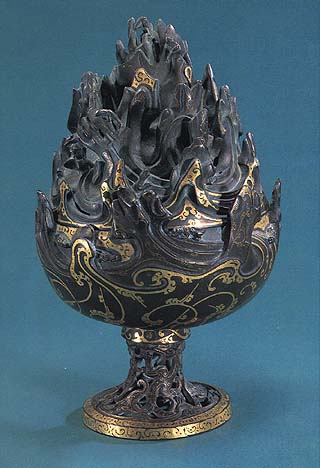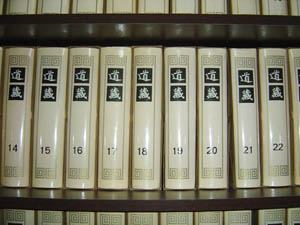Daoism's doctrine on sex and sexual practices is one of the most misunderstood aspects of Daoism.
I recently dove into the debates about gay marriage on some political blogs. I'm not going to link to them because I was just goofing around. But in the process of considering some of the strange and desperate arguments put forward against gay marriage, it suddenly struck me that many people actually don't know what sex is. Wow, what a shock.
So I thought I would try to shoot two pheasants with one arrow, and exposit both subjects.
The Daodejing has a phrase,
"If Heaven has a reason, nobody knows it."
I think this is a good place to start. We don't know why life exists. We are capable, however, of recognizing that there are two categories, "alive" and "not alive," and that we belong to the category, "alive." (I have talked about the blended categories of ghosts and other such "part alive, part not-alive" entities in previous posts--so I'll skip that part of the argument here.)
One of the distinguishing characteristics of the "alive" category is that we are capable of reproducing ourselves. The substance, force, and function which reproduces itself in all life is called in Chinese: Jing. The word therefore includes English words like, sperm or eggs, and underlays English functions like scabbing, and regenerating.
All living things ingest qi (air/water/nutrients/light) and transform some of it into jing. Plants and animals which reproduce themselves sexually also differentiate themselves (to some degree) into male and female genders (or parts of themselves in some cases such as worms and slugs). Sexual reproduction requires that the two genders of a particular species combine their jing.
All living things produce way more jing than they actually need for sexual reproduction to be successful, and way more jing than ever gets used in the sexual reproduction process. In other words, sex is very inefficient, A plant or animal can be extremely potent in its production of jing, and still not produce offspring.
Here are some examples. Some chickens lay eggs everyday. Cockroaches and mosquitoes produce eggs in the millions, with very low survival rates for individual eggs. During certain times of year, the grass and trees are constantly trying to have sex with my eyes and nose (pollen). Dogs hump people's legs.
You can fit a million sperm on the tip of a pin.
The process of transforming qi into jing has two basic routes it can follow:
- Qi can transform into jing which regenerates and heals the individual living entity.
- It can produce sperm, eggs, pollen or ovules.
Some Daoist practices seek to gain some volition over this process so that less qi will go down the sperm and egg producing path and more qi will go towards producing jing used for regeneration or healing.
Many plants produce beautiful flowers which take advantage of animal desires to help them combine their jing (pollen with ovules). Animal behavior which can lead to the combining of the jing of two animals of the opposite gender is, like jing production, incredibly inefficient in every species.
According to Joseph Needham in Science and Civilization, the three basic sex hormones were recognized and isolated into pure substances in China during the 5th century CE.
Daoist practices aren't concerned with hormones directly, but they recognize that certain foods, exercises, activities and even uses of the mind, can effect how much a person is concerned with or even obsessed with sex. More importantly, they recognised that no matter what we do, we are likely at any one moment to be transforming way more qi into jing than we actually need for producing a few viable offspring.
This natural inefficiency is inseparable in animals from the thorny issue of desire. Daoist practices can be divided into two categories.
- Leaning how stop ovulation so that you ovulate only when you have decided to attempt reproduction.
- Reducing or limiting desire.
Desire is a physiological part of our survival apparatus. It is also incredibly inefficient. When desire builds we become totally focused--to the exclusion of other information. To quote the huainanzi, "We run rough-shod over subtlety."
Thus, for Daoists, the physiology of efficiency takes on a moral dimension. Inappropriate behavior is not considered unnatural, it is simply excessive or deficient--misdirected or too strong.
The primary methods through which Daoism engages with desire, are the making of commitments and the refining appetites.
This always begs the question: How can we tell an appetite from a desire? There isn't a simple answer. Appetites generally include assessment and evaluation phases, they are more reflective and experimental-- less driven.
However, it would be a mistake to think that either appetites or desires are somehow rational. I guess you could say that appetites are to desire what reproduction is to sex.
Since all human sexual activity--from putting on lipstick to bumping chests with your male competitors, to vaginal intercourse itself--is naturally inefficient and rarely results in offspring, the desire to have sex with someone of the same gender, with a tree, or with a consenting gorilla, is all just part of this wild inefficiency and abundance we call life.
But if you've ever contemplated a rushing river pouring over a cliff, you already know this.
.
 This is such a good title, I wish I had content that would live up to its promise. Still, I couldn't resist.
This is such a good title, I wish I had content that would live up to its promise. Still, I couldn't resist.

 The quest for power is endless.
The quest for power is endless. No, the Internal Martial Arts were developed by people who had already cultivated a subtle body; a weak, sensitive, feminine (yes I said that), humble, yielding, and desireless physicality. A body cultivated with the idea that lack of pretense is not only a moral way of being; but a moral way of moving.
No, the Internal Martial Arts were developed by people who had already cultivated a subtle body; a weak, sensitive, feminine (yes I said that), humble, yielding, and desireless physicality. A body cultivated with the idea that lack of pretense is not only a moral way of being; but a moral way of moving. The so called
The so called  So my advise to people interested in The Five Healing Sounds would be to avoid the qigong hysteria. I would also advise avoiding spirit mediums, unless you already have one in the family. If you can find a master Chinese Opera vocalist, he can to teach you how to sing from the different organs. Chinese Opera vocal training is likely to blow your mind.
So my advise to people interested in The Five Healing Sounds would be to avoid the qigong hysteria. I would also advise avoiding spirit mediums, unless you already have one in the family. If you can find a master Chinese Opera vocalist, he can to teach you how to sing from the different organs. Chinese Opera vocal training is likely to blow your mind. A female friend of mine was recently attacked by a crazed crackhead half block from her house. He was big and he kicked her in the ribs.
A female friend of mine was recently attacked by a crazed crackhead half block from her house. He was big and he kicked her in the ribs. Hexagram 10 of the
Hexagram 10 of the  Chinese Internal Martial Arts cultivated with a Daoist perspective achieve quite the opposite results of what most people think. These arts are not about gaining control. They are not about preparing for some monstrous future attack. They are not about trying to control or predict the future.
Chinese Internal Martial Arts cultivated with a Daoist perspective achieve quite the opposite results of what most people think. These arts are not about gaining control. They are not about preparing for some monstrous future attack. They are not about trying to control or predict the future. In Buddhism they have the expression, "Skillful Means," to describe brilliant techniques on the road to enlightenment. But it's also kind of a Buddhist joke because the end result requires no skill at all.
In Buddhism they have the expression, "Skillful Means," to describe brilliant techniques on the road to enlightenment. But it's also kind of a Buddhist joke because the end result requires no skill at all. Her innocent response was good enough.
Her innocent response was good enough. This translation is by
This translation is by 


